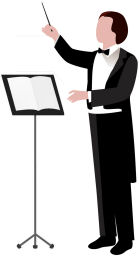Close Harmony - Conductor
Conductus - Cyclic Form
 Clef - (French) "key"; notation indicating the key of the composition; notation which denotes the key of a score; see also G-clef, C-clef, F-clef
Clef - (French) "key"; notation indicating the key of the composition; notation which denotes the key of a score; see also G-clef, C-clef, F-clef
Close Harmony - a layered effect of harmony between the notes of a chord and the melody; the close arrangement of the notes of a chord within the octave
Cluster - simultaneous sounding of adjacent notes on a keyboard accomplished by pressing the keys with the palm, fist, or forearm; also called tone cluster
 Coda - (Italian) "rail"; the end of a musical phrase; notation indicating the end of a musical passage to be repeated; point of return to a repeat mark
Coda - (Italian) "rail"; the end of a musical phrase; notation indicating the end of a musical passage to be repeated; point of return to a repeat mark
Col legno - (Italian) "with the wood"; direction to tap the strings with the wood side of the bow; use the wood of the bow
Colla parte - (Italian) "with the soloist"; direction to conductor or musician to follow the tempo and rhythm of the soloist during a musical passage or section
Coloratura - (Italian, Latin) "to color; coloring"; a soprano specializing in ornate singing styles; elaborate embellishment of a operatic vocal melody
Col legno - (Italian) "with the wood"; to strike the strings with the bow
Col legno battuto - (Italian) "beaten with the wood"; to strike the strings with wood side of the bow
Col pugno - (Italian) "with the fist"; direction to play or bang sternly on the piano
Combination Tone - the tone produced by sounding two notes together
Come Prima - (Italian) "as at first"; repeat or return to the original tempo
Commedia Dell' Arte - (Italian) "comedy of the profession"; a 16th to 18th century social theatre work characterized by masked performers and the arrival of actresses; a Burlesque type of comedic theatre production of medieval Italy
Commodo - (Italian) "comfortable, convenient"; play at a moderate or comfortable tempo; alternative spelling: comodo
 Common Time - another name for 4/4 time signature indicating four evenly spaced beats per measure; musical notation of 4/4 time resembling the letter C;
Common Time - another name for 4/4 time signature indicating four evenly spaced beats per measure; musical notation of 4/4 time resembling the letter C;
Compass - the available range of voice and instruments from highest to lowest, the lowest tone at a set pitch and the highest tone per the performer's ability
Composition - a musical work; a written piece of music; the act of writing music
Compound Interval - any interval between more than two notes of its octave
Compound Time - a meter or time signature which is divided into three equal counts; I.e, the number of beats per measure is equal to the upper number of the time signature divided by three.
Comprimario - (Italian) "with the primary"; the singer of subordinate part in opera; a small supporting vocal role in an opera
Con amore' - (Italian) "with love"; play tenderly; play in a delicate manner
Con brio - (Italian) "with spirit"; play vigorously; play with spirit
Con allagrezza - (Italian) "with liveliness"; play in a lively or engergetic manner
Con amore' - (French) "with tenderness"; play in a tender or compassionate manner
Concert - a musical performance before an audience; a performance given by a musical choir, band, ensemble, or orchestra
Concert Band - an ensemble of brass, percussion, and woodwinds which gives concerts; a military band that holds concerts instead of marching
Concert Master - the first chair violinist in an orchestra; leader
Concertino - (Italian) "little ensemble"; a short light concerto; the soloist(s) of a concerto grosso; see concerto
Concerto - (Italian) "to join or tie"; a musical piece normally of three movements in which a soloist or group of soloists perform with an orchestra, alternating in opposition, accord, or independence
Concerto Grosso - (Italian) "big concert"; a musical form of the Baroque period in which the music is applied to both a small group of soloists and the orchestra
Concord - (Anglo-French, Latin) "together"; in harmony; a chord or group of tones which sound tunefully pleasing; the opposite of discord
Conduct - to direct the performance of a musical group
Conductor - the guide of an orchestra who keeps time and cues the musicians; one who maintains the integrity of the composition by means of leading the orchestra; Right: Conductor

Conductus - (Latin) "to escort"; the music used for singing chants; a type of sacred or religious chanting vocal music originating in Medieval France
Conjunct - an adjective referring to a melodic line which moves step by step, as opposed to disjunct or moving by leaps
Conservatory - 16th century Italian orphanage which taught music; an educational institution of the musical, dance, or dramatic arts; a music school
Consonance - simultaneous sounding of two tones in harmony; see also Concord
Con Sordino - (Italian) "dull, muffled"; instruction to play muted; dampen or soften the sound
Consort - a group of musical instruments or players;
Consorts - a family of musical instruments such as brass, keyboard, percussion, strings, or woodwind; the groups of similarly constructed instruments
Contano - (Italian) "to count"; a direction to count during a rest to maintain accurate timing
Continental Fingering - the globally adopted method of finger placement on the keys of the keyboard
Continuo - (Italian) "figured"; figured bass; a form of simplified Baroque notation which indicates that chords, intervals, & tones play in relation to the bass line written directly below each; see also basso continuo
Contra - (Italian) "against"; prefix denoting a lowering of pitch as in contrabass, typically an octave lower or with the lowest pitched instrument
Contrabasso - (Italian) "lowered bass"; alternative name for the double-bass
Contrafactum - (Latin) "counterfeit"; a 14th century Italian vocal piece in which common song lyrics are replaced with religious text
Contralto - (Italian) "lowest"; the lowest pitched female vocalist
Contrapuntal - (Latin) "note to note"; a musical work developed during the Renaissance of two or more melodic lines; a musical piece written in counterpoint
Coperto - (Italian) "covered"; muting a drum's sound by placing a cloth over it
Corda - (Italian) "string"; a keyboard pedal use instruction as in una corda
Cori Spezzati - (Italian) "broken choir"; early Medieval Jewish practice of placing vocalists in other parts of the room or building to achieve a choral effect
Corranach - (Irish) "together"; An Irish funeral dirge typically chanted by a bard accompanied by the harp; a song or lamentation for the dead
Count - a series of regular occurring beats or sounds; the method of keeping the beat to maintain proper timing
Counterpoint - (Latin) "punctus contra punctum, note against note"; a harmonious answer or argument interdependent with the main musical idea; the art of setting melodies in conjunction with one another developed during the Renaissance
Countertenor - a classical male vocalist, natural or falsetto, whose range reaches the higher soprano pitches of a castrato
 Crescendo - (Italian) "increasing"; instruction to gradually increase the volume (above the staff); slowly get louder; swelling the intensity
Crescendo - (Italian) "increasing"; instruction to gradually increase the volume (above the staff); slowly get louder; swelling the intensity
Croma - (Italian) "quarter"; Italian term for crochet or quarter-note
Crooning - the popular practice of singing in a soft and sentimental tone of voice developed in early 20th century radio
Cross-Rhythm - one of the polyrhythms also called cross-beat; a regular pattern of accents contradicted by a conflicting pattern; the use of conflicting rhythms in repetition for an non-syncopated pattern
 Crotchet - (French) "little hook"; quarter note; note which takes up one quarter of a whole note or measure; Right: quarter-note
Crotchet - (French) "little hook"; quarter note; note which takes up one quarter of a whole note or measure; Right: quarter-note
Cuivre' - (French) "brassy"; instruction to play with a forced sound or stident tone
Custos - (Latin) "guard"; notation used at the end of sheet music pages which indicates the pitch of the first note on the next page or line of music; direct
Cycle - a group of songs or works to be performed together began in 19th century Germany, each in the same or a contrasting key; see song cycle
Cyclic - occurring in cycles; relating to the re-occurrence of a musical idea
Cyclic Form - a form in which the same melodic material occurs in multiple movements to tie or unify all movements into the main musical idea or theme


